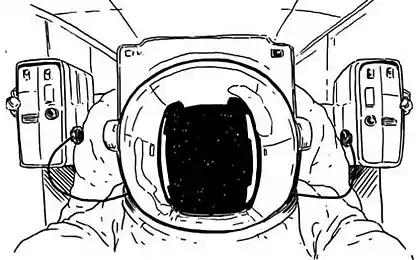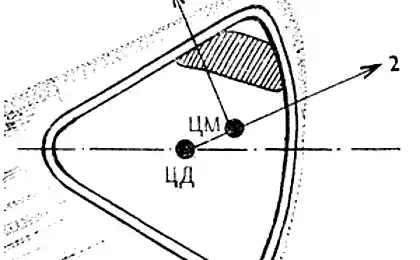Psychological transformation, which affects only the astronauts
We know very little about the impact that space flight on the human psyche. But what little we know suggests that this effect is very strong. Given the intensification of space programs aimed at colonizing Mars, it is imperative to psychologically prepare astronauts for long flights.
Once Edgar Mitchell, the Apollo 14 crew member, described his condition when he first saw the Earth from space:
You covers a comprehensive and deep awareness of the way, the direction in which humanity goes, and a strong sense of disappointment on the condition of the world, and an obsessive desire to do something, fix it. From there, the moon, international politics look like child's play. Want to grab all these politicians by the neck and drag them for a quarter of a million miles out and say, "Look at that, you son of a bitch». Blockquote>
It's an instant sense of awareness is the hallmark of a symptom of that, the writer and philosopher Frank White called "the effect of the overall review »(overview effect) in the eponymous book. By the way, the immortal monologue Carl Sagan The Pale Blue Dot is, in fact, the classical description of the "effect of the overall review." < br />
Sydney Brownstone (Sydney Brownstone), is studying the effect, writes:
This vysokoemotsionalnoe abnormal condition, the test to be in space, a kind of cosmic sign of human progress. Frank White came to this idea in 1987, and today it has become a kind of spiritual backbone of the industry of commercial space tourism. After the death of several astronauts in the explosion of the "Challenger" in 1986, Uyat stated in his work The Overview Effect: «space exploration and the evolution of humanity, absorbing national budgets do not allow us to fully exploit the full potential of space exploration. The effect of a general review - which, in theory, spur humanity to resettle outside the Earth for their own survival - will help us in this. » Blockquote>
Brownstone talked to several pilots, astronauts, historians and experts Aeronautics about their feelings and experiences, but of particular interest are thinking Mae Jemison effect on the overall review:
Jamison experienced the effect of this in preparation for space flight. But this event was different in her response, in contrast to the other astronauts. "When I read The Overview Effect, people began to talk about the fact that their hearts are associated with this planet. But when I was in space, I felt that all connected with the whole universe. Sometimes in the world, I even feel more isolated from the rest of the universe. I felt that I had as much right to be in the space, in this universe, as well as any particles of interstellar dust. I feel just as eternal. »
Jamieson believes that whatever feeling you did not cover in space, it depends on your perception, view of the universe - and your own existence - hence, with the Earth. And in this regard, as she says, an overview can be only one of many new space syndromes that affect people leaving their home planet. "In a sense, space flight is a Rorschach for your faith.» blockquote>
We need a lot more to learn about the psychological effect exerted during space flight, whether it is on the short flight of the atmosphere or mission into deep space. Many studies of the psychological state of the people trapped in long-term isolation in a confined space, given the very diverse results.
Take, for example, Mars-500 mission of the European Space Agency. Four of the six members of the experiment reported "behavioral stimuli" and "psychological distress" that led to interpersonal conflicts and tense relations between the crew and the mission leadership.
Passed 520 days, Mars-500 experiment was the longest on psychological isolation in the history of ESA, but although the conditions of stay "on board" were not easy, they are not particularly shed light on what the astronauts might face during this flight to Mars. Crew, goes on a journey into one end, it is necessary to be able to mentally accept the fact that they are literally millions of miles from home, locked in a close box, without any possibility to leave (at least until a successful landing on Mars or forced return the Earth).
It is noteworthy that participants in the experiment Mars-500 never had a chance to test the effect of the overall review, all this time they will not fly. The downside of the feelings of novelty brought by the effect of the overall review is the anxiety of such a large distance from the house. Neither party Mars-500 experiment does not wish to leave the "base", even though they had the opportunity. Therefore, one can not discount the influence of a sense of security from what they have always known that they have a "back door."
Source: geektimes.ru/post/241076/






















